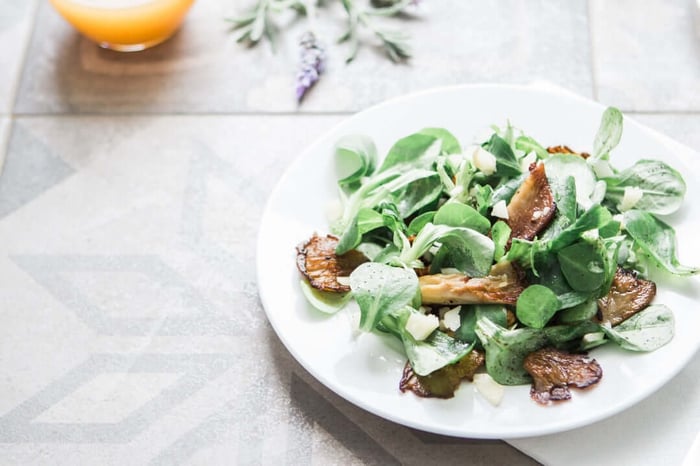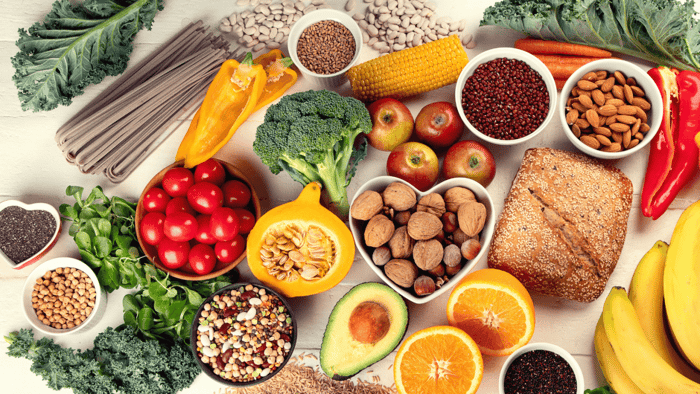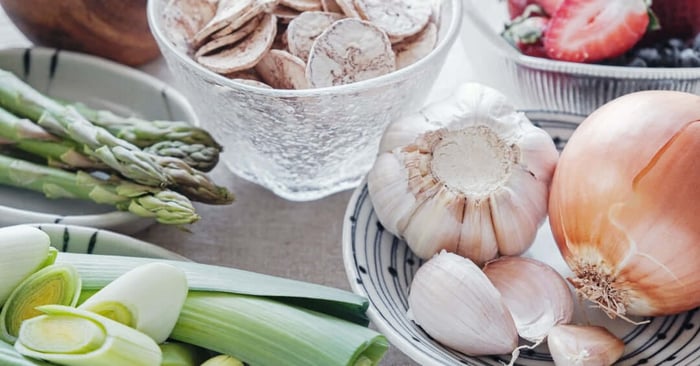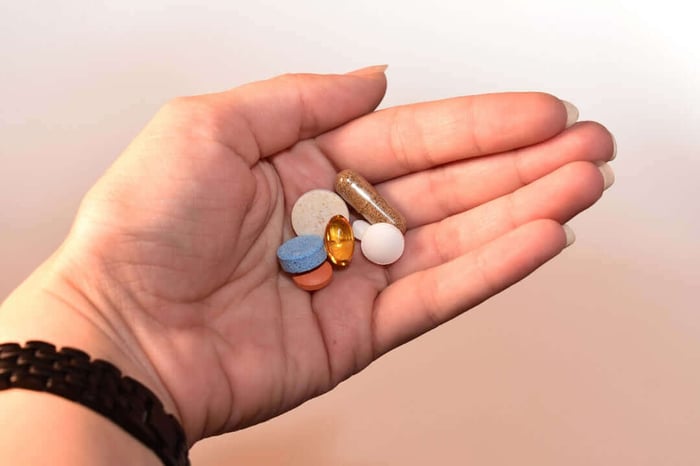We hear a lot about probiotic supplements and digestive enzymes to boost gut health. But prebiotics don’t get talked about much, and yet they’re just as important for your digestive health.
Whether you’re already on a probiotic supplement, taking both probiotics and prebiotics, taking vitamins and minerals, or you’re not taking any supplement, making sure your diet includes a variety of foods with prebiotics is key to improving your gut health naturally.
Let’s take a deeper look at this misunderstood ingredient!
What Are Prebiotics?
Let’s start off answering what probiotics are, because that’s essential to know in order to understand what prebiotics are. Probiotics are the good gut bacteria found in your digestive system. They fight off bad bacteria and help support the work of digestive enzymes, essentially holding down the fort so enzymes can help you digest your food effectively.
Prebiotics are their food. Yes, prebiotics feed these good bacteria in your gut. And similar to how you won’t be able to run a marathon very well on an empty stomach, your gut bacteria need to be well-fed in order to be able to do their job properly.
Do I Need a Prebiotic Supplement?
Prebiotic supplements can be handy if you have gut issues. They’re very helpful if you’re on a probiotic supplement. But in general, simply upping your intake of prebiotic-rich foods can help to improve your gut health.
It’s one less pill to take and an opportunity to spice up your daily meals! With that in mind, we’ve compiled a list of some of the best foods with prebiotics so you can start figuring out how to incorporate them in your meals.
The Best Synbiotic Combo: Click Here Now to Check It Out
Foods With Prebiotics
These foods are packed with dietary fiber and a host of other healthy stuff. Adding them to your diet more often will improve your digestive system, but also just give your overall health a boost.
Note that you can get as creative as you want with these foods! Let’s look at each one, its benefits, and how you can use it in your everyday diet.

Vegetables
1. Garlic
Garlic is a superfood, and it deserves that description! It has anti-inflammatory, and antioxidant properties, and even lowers blood sugar levels. And of course, it’s delectably flavorful if you use it in the right quantities.
It’s proven to be an effective prebiotic food, promoting the growth of Bifidobacteria, one of the best healthy bacteria in the gut (1). Just use it in moderation if you have to go out and speak to people the day after!
2. Onions
Onions can be added to almost any meal in moderation, making them one of the most versatile vegetables out there. And like garlic, they have antioxidant properties, anti-cancer properties, and do amazing things for the immune system.
Their high fructo-oligosaccharides (FOS) content helps to boost gut flora, among other things (2). Simply chop them up and add them to salads (raw is great but spicy!), fry them with stir fry, or roast chunks of onion with any other roast vegetables.
3. Asparagus
Asparagus is a common vegetable but did you know it’s excellent for prebiotics? It contains inulin, which is an insoluble fiber. This particular substance is a favorite meal of good bacteria in your gut! Add it as a side to any meal for a prebiotic boost.
4. Chicory Root
You may know chicory root as “fake coffee”. It’s the mild stuff that gives you a bit of a boost and a great taste but doesn’t isn’t as strong as coffee. The good news is that it’s chock full of prebiotic fiber, which in this case helps boost digestion, relieve constipation, and improve bowel function (3). You can start drinking chicory coffee or cook with the spice for a bit of flavor.
5. Yacon Root
Yacon root is a white vegetable that’s quite similar to sweet potato. It’s loaded with inulin and prebiotic FOS (4), so if you can add it to your meals a few times a week, you’ll be feeding your gut bacteria well!
Interestingly, it contains no starch and can be eaten raw, unlike sweet potato. You can cook it and eat it as you would any old potato, or eat it in crudit form.
6. Dandelion Greens
These are the green leafy parts of the dandelion plant, and can be cooked or eaten raw. They’re an excellent source of prebiotic fiber, most of which comes from the all-important inulin (5).
7. Jerusalem Artichoke
This is a little bit of a lesser known food, but it’s one you should be adding to your meals. Not just for the fiber, but for the taste! It brings a sweet yet nutty flavor to whatever you cook it with, and it can be eaten raw as well. With 2 grams of inulin per 100 grams, it’s a prebiotic powerhouse (6).
8. Konjac Root
Konjac root is a tuber, an underground root. Interestingly, in this case it’s a substance called glucomannan fiber that gives it great prebiotic properties (7). You can cook it on its own or consume foods made from konjac, like shirataki noodles or items made from konjac flour.
9. Jicama
Jicama root is a crunchy, fibrous tuber that, according to those who’ve eaten it, tastes like an apple and a potato combined. It’s also high in inulin, making it a potent prebiotic food.
10. Mushrooms
This is a common veggie that you may already be eating regularly! They’re a great source of prebiotics, but they also contain small amounts of amino acids, vitamins, and minerals. They’re as easy to eat as adding to your stir fry, omelet, or even raw in a salad! (8)
Brand New: The Best (Doctor-Recommended) Probiotic on the Market

Fruits
11. Bananas
The key to getting as much prebiotic fiber out of your bananas as possible is to eat them just before they’re actually ripe. Not only do they contain inulin, but unripe bananas are high in resistant starch, which has excellent prebiotic characteristics (9). If you can’t stomach the thought of eating one, you can use green banana flour to do some baking.
12. Apples
Apples are loaded with pectin, which is a type of insoluble fiber that increases your body’s levels of butyrate. This is a fatty acid that boosts good gut bacteria and decreases the bad stuff (10).
13. Blueberry, Pear, Watermelon, and Nectarine
We’re putting these together under one heading thanks to this study, which specifically singles out these fruits as being excellent sources of prebiotics (11).
Grains
14. Wheat Bran
This is the outer layer of wheat, and it’s super high in prebiotic fiber. Studies show that ingesting it boosts Bifidobacteria in the gut microbiome (12). The best way to get wheat bran into your diet is to use it as a thickening agent in stews, soups, or sauces.
15. Barley
This is what’s used to make beer! It’s high in a particular prebiotic fiber called beta glucan, which promotes good bacteria in your gut (13). You can cook it and eat it with foods like stew, as an alternative to rice or couscous.
16. Oats
Whole oats are rich in both beta glucan and resistant starch. Together, these do wonders for your gut bacteria (14). As a bonus, beta glucan has been shown to regulate appetite (15). Cook them into porridge for breakfast, or if you love snacking, make oat bars!
Other
17. Seaweed
Seaweed has more health benefits than you may imagine! Not only is it rich in prebiotic fiber (16), but it also contains high levels of iodine, which most people are slightly deficient in. If sushi is your thing, it’s a great excuse to eat more of it!
18. Flaxseed
Flaxseeds are an excellent source of healthy fats, but they also contain prebiotics that can regulate your digestive function and reduce the amount of fat your body absorbs (17). They’re easy to sprinkle into yogurt or add to smoothies.
19. Cocoa
Cocoa is a potent source of polyphenols, which have anti-inflammatory and antioxidant effects. This can help to boost healthy bacteria while getting rid of harmful bacteria (18).
Unfortunately, this doesn’t mean you can eat all of the chocolate! While this is the same stuff that goes into making chocolate, we recommend choosing cocoa powder. It’s easy to add to yogurt, smoothies, oatmeal, or even make a hot drink with!
Conclusion
There’s no need to go out and spend money on a prebiotic supplement when you can simply increase your intake of foods with prebiotics. The best news is that they’re all healthy, nutrient-dense, and many of them are low-calorie. Easy to fit in, even if you’re dieting!
If you’re eating a diet high in prebiotic fiber, taking steps to increase your good gut bacteria, and staying properly hydrated but you’re still struggling with gut issues… Then it may be a good idea to see your doctor and ask about supplements to help balance your gut microbiota out.





